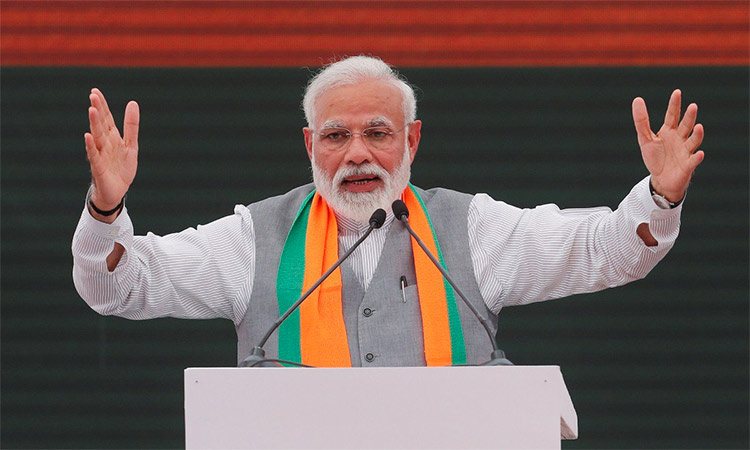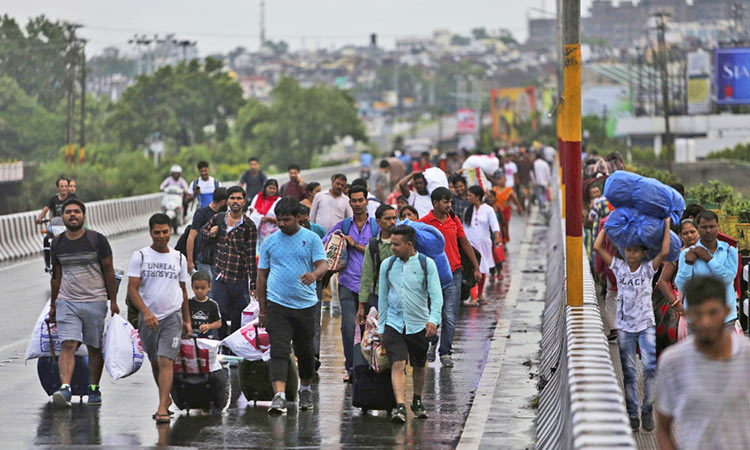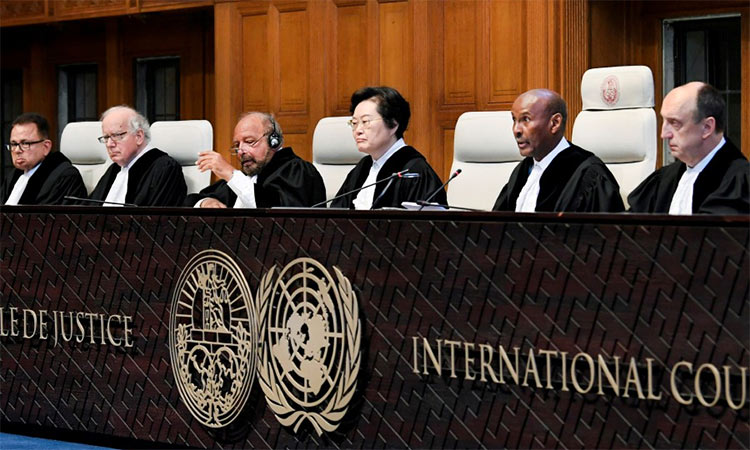Modi’s population control talk raises concern
BRP Bhaskar

Narendra Modi
On Independence Day Prime Minister Narendra Modi caused eyebrows to rise by stating in his address that the rate of growth of the country’s population is worrisome.
At the last count in 2011 India’s population was about 1.25 billion. Modi’s foreboding is out of tune with the optimistic note of the Economic Survey his government placed before Parliament. It said population in the 0-19 age group had peaked and the total fertility rate was expected to fall below the replacement level by 2021.
India had launched a family planning programme in the 1950s when there was acute food shortage and the population was growing at a higher rate than the economy.
On a visit to Tokyo in 1969 Prime Minister Indira Gandhi told her Japanese counterpart Eisaku Sato about the efforts to check population growth. “I do not know if you are doing the right thing,” he said. “After the War we undertook a very successful birth control programme. We are now experiencing severe labour shortage.”
The two leaders were looking at population from different angles. For Mrs Gandhi, saddled with a struggling economy, people meant mouths to feed. For Saito, presiding over a booming economy, people meant hands to work.
Except for a brief period during Indira Gandhi’s Emergency, when her son, Sanjay, functioning as an extra-constitutional authority, promoted forced sterilisation, India’s population control programme, unlike China’s, was voluntary and did not involve penal provisions.
Once India became self-sufficient in food production, population control lost its sense of urgency. Successive governments cut budget allocations for family planning or diverted the funds to other programmes.
Census data testifies to a steady fall in the rate of growth of the population from 2.21 per cent a year in 1971-81 to 2.16 per cent in 1981-91, 1.97 per cent in 1991-2001 and 1.64 per cent in 2001-11. The next census is due only in 2021. But, in this year’s State of the World Population report, the UN said India’s growth rate fell to 1.2 per cent during 2010-2019.
Studies across the globe have established that population growth declines as education spreads and economic conditions improve. India’s own experience confirms this.
With a large young population, resulting from the high growth rate of earlier decades, India is said to be in a position to get a demographic dividend in the current phase of speedy growth.
The Prime Minister’s harking back to the population problem even as he talks of building a $5 trillion economy, therefore, came as a surprise.
One possible explanation is that the source of his worry is the inability to create jobs for the new entrants to the workforce. Currently the country is experiencing jobless growth.
Another possibility is that, coming after the abrogation of Jammu and Kashmir’s special status, the population issue is a bogey raised to set the stage for the next part of the Bharatiya Janata Party’s Hindu rashtra (nation) project.
Modi spoke of population growth without mentioning any religious group. But the Shiv Sena, the BJP ally which shares its Hindutva ideology, immediately linked it to the growth of the Muslim population. Hindutva votaries have often kindled fears of the Muslim minority becoming the majority community in order to promote Hindu consolidation.
The 2011 census indicated that during the previous decade the Muslim population grew at 2.2 per cent a year and the Hindu population at 1.55 per cent. During this period the Hindu population fell from 80.45 per cent to 79.8 per cent and the Muslim population rose from 13.4 per cent to 14.2 per cent.
Citing these figures, some argued that eventually India will have a Muslim majority. They conveniently overlooked the fact that the Muslim growth rate was falling faster than the Hindu growth rate. Projections based on current trends indicate that, far from Muslims outnumbering Hindus, the Hindu and Muslim populations will stabilise in the 4:1 ratio by the middle of the century.
Speculative reports that Modi is planning legislation to enforce population control have engendered fears that, like Sanjay Gandhi’s Emergency exercise, it will be directed primarily against the minority community.
The southern states have already lowered the growth rate drastically. Kerala’s population growth during the 2001-11 decade was less than five per cent as against the national average of 17.7 per cent.
Any genuine population control programme must focus on the large Hindi heartland states, Uttar Pradesh, Bihar, Rajasthan and Madhya Pradesh, all of which recorded decadal growth rates above 20 per cent. ---Gulf Today, Sharjah, Augusr 20, 2019.
At the last count in 2011 India’s population was about 1.25 billion. Modi’s foreboding is out of tune with the optimistic note of the Economic Survey his government placed before Parliament. It said population in the 0-19 age group had peaked and the total fertility rate was expected to fall below the replacement level by 2021.
India had launched a family planning programme in the 1950s when there was acute food shortage and the population was growing at a higher rate than the economy.
On a visit to Tokyo in 1969 Prime Minister Indira Gandhi told her Japanese counterpart Eisaku Sato about the efforts to check population growth. “I do not know if you are doing the right thing,” he said. “After the War we undertook a very successful birth control programme. We are now experiencing severe labour shortage.”
The two leaders were looking at population from different angles. For Mrs Gandhi, saddled with a struggling economy, people meant mouths to feed. For Saito, presiding over a booming economy, people meant hands to work.
Except for a brief period during Indira Gandhi’s Emergency, when her son, Sanjay, functioning as an extra-constitutional authority, promoted forced sterilisation, India’s population control programme, unlike China’s, was voluntary and did not involve penal provisions.
Once India became self-sufficient in food production, population control lost its sense of urgency. Successive governments cut budget allocations for family planning or diverted the funds to other programmes.
Census data testifies to a steady fall in the rate of growth of the population from 2.21 per cent a year in 1971-81 to 2.16 per cent in 1981-91, 1.97 per cent in 1991-2001 and 1.64 per cent in 2001-11. The next census is due only in 2021. But, in this year’s State of the World Population report, the UN said India’s growth rate fell to 1.2 per cent during 2010-2019.
Studies across the globe have established that population growth declines as education spreads and economic conditions improve. India’s own experience confirms this.
With a large young population, resulting from the high growth rate of earlier decades, India is said to be in a position to get a demographic dividend in the current phase of speedy growth.
The Prime Minister’s harking back to the population problem even as he talks of building a $5 trillion economy, therefore, came as a surprise.
One possible explanation is that the source of his worry is the inability to create jobs for the new entrants to the workforce. Currently the country is experiencing jobless growth.
Another possibility is that, coming after the abrogation of Jammu and Kashmir’s special status, the population issue is a bogey raised to set the stage for the next part of the Bharatiya Janata Party’s Hindu rashtra (nation) project.
Modi spoke of population growth without mentioning any religious group. But the Shiv Sena, the BJP ally which shares its Hindutva ideology, immediately linked it to the growth of the Muslim population. Hindutva votaries have often kindled fears of the Muslim minority becoming the majority community in order to promote Hindu consolidation.
The 2011 census indicated that during the previous decade the Muslim population grew at 2.2 per cent a year and the Hindu population at 1.55 per cent. During this period the Hindu population fell from 80.45 per cent to 79.8 per cent and the Muslim population rose from 13.4 per cent to 14.2 per cent.
Citing these figures, some argued that eventually India will have a Muslim majority. They conveniently overlooked the fact that the Muslim growth rate was falling faster than the Hindu growth rate. Projections based on current trends indicate that, far from Muslims outnumbering Hindus, the Hindu and Muslim populations will stabilise in the 4:1 ratio by the middle of the century.
Speculative reports that Modi is planning legislation to enforce population control have engendered fears that, like Sanjay Gandhi’s Emergency exercise, it will be directed primarily against the minority community.
The southern states have already lowered the growth rate drastically. Kerala’s population growth during the 2001-11 decade was less than five per cent as against the national average of 17.7 per cent.
Any genuine population control programme must focus on the large Hindi heartland states, Uttar Pradesh, Bihar, Rajasthan and Madhya Pradesh, all of which recorded decadal growth rates above 20 per cent. ---Gulf Today, Sharjah, Augusr 20, 2019.

